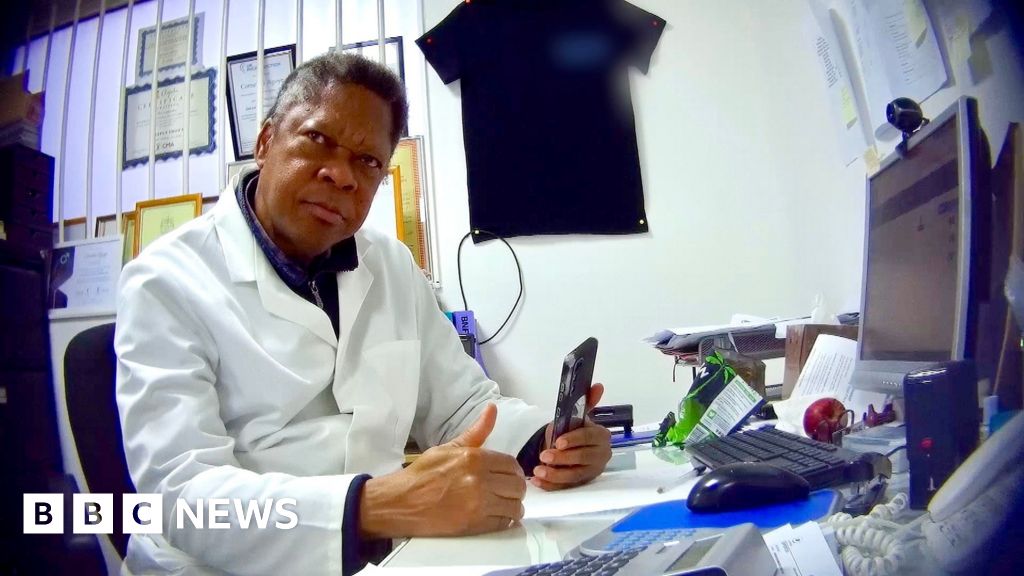Guy LynnBBC Investigations, London
A pharmacist filmed selling Botox without seeing patients has been suspended from practice for 18 months after a BBC undercover investigation exposed a dangerous black market in injectable cosmetic drugs.
Cornelius Agoye, who ran Pharma Aesthetics London in Rainham, east London, was recorded supplying licensed Botox to an undercover BBC researcher posing as a beautician, and explaining how to falsify paperwork to make it appear legitimate.
The investigation found multiple nurses and pharmacists breaking the same rules — agreeing to issue or sell Botox without ever meeting patients in person, putting them at risk.
Mr Agoye later admitted his behaviour fell below professional standards.
He also apologised, saying he had not intended to cause harm.
Mr Agoye has been suspended under an interim order imposed by the General Pharmaceutical Council (GPhC) while a full fitness-to-practise investigation continues.
Botulinum toxin – commonly known by the brand name Botox – is also sold under several other licensed brands in the UK, including Azzalure, Bocouture and Dysport.
It is a prescription-only medicine and, while many people now receive injections from High Street beauticians, the law requires a doctor, dentist, nurse prescriber or pharmacist prescriber to examine the patient face to face and issue a prescription confirming it is safe to proceed.
Experts told the BBC that bypassing those consultations removes a vital medical safeguard designed to ensure the drug is suitable for each individual — and allows counterfeit or unsafe products to enter the market.
Misuse of Botox can cause drooping eyelids, blurred vision, headaches and, in rare cases, respiratory failure or paralysis.
Over several months, BBC researchers filmed registered professionals across England sidestepping the rules.
Transactions were captured in clinics, pharmacies and online, showing how illegal Botox has spread across the country’s booming aesthetics industry.
Market analysts estimate the UK botulinum toxin market was worth £115m in 2024 and is forecast to reach nearly £295m by 2031.
What happened inside the pharmacy
In east London, Mr Agoye met an undercover BBC reporter at his Rainham pharmacy, believing she was a beautician seeking Botox stock and prescriptions for her clients. Hidden cameras recorded him agreeing to help without asking to see any patient or carry out the legally required assessment.
He instructed the reporter to falsify the records, saying she should enter notes claiming a consultation had already taken place. “I did face-to-face consultation today… I’ve just done it,” he said.
He then explained how beauticians could use a genuine patient’s prescription to order extra vials and keep the spare doses for other paying clients.
“You just order two Botoxes like you’ve done one, for one patient,” he told the reporter. “You hide one. I didn’t say anything to you, you just hide one.”
When asked if that was legal, he replied: “Yeah, you’re going to do it illegally… That’s what you’re doing. I didn’t tell you anything.”
Prescribing a drug in one person’s name for use on another constitutes fraud.
Interim orders
These are urgent measures used when early evidence suggests a pharmacist may pose a continuing or immediate risk to patients, or when public confidence in the profession could be seriously damaged if a pharmacist continues to practise without restriction.
They can be applied before a hearing concludes if a pharmacist’s behaviour appears to present a “serious, continuing, immediate or real” threat to safety or trust.
Wider malpractice
The BBC’s Botox Black Market investigation uncovered wider misconduct among nurses and pharmacists supplying Botox to beauticians without prescriptions — and selling unlicensed toxins for cash.
In Dorset, nurse prescriber Sally Jackson was filmed offering to issue Botox prescriptions via WhatsApp without ever meeting patients, saying she was “too busy” for in-person checks. She admitted she could put extra orders under an existing patient’s name so beauticians could stock up and use them on others.
In north London, clinic owner Prakash Gurnani — who falsely claimed to be a doctor — was recorded selling cheap, unlicensed Korean toxin vials, telling clients to call them simply “anti-wrinkle” injections and keep quiet. He described holding “Botox parties” for groups of young women and was also filmed offering prescription-only weight-loss drugs and an illegal anaesthetic.
Both Ms Jackson and Mr Gurnari declined to comment; when confronted by the BBC, he denied offering Botox illegally or asking clients to break the law.
Medical experts told the BBC that such shortcuts by qualified professionals stripped away basic safeguards and pushed potentially counterfeit products into the beauty trade. The UK Health Security Agency recently linked 41 confirmed cases of botulism to the use of an unlicensed toxin bought from beauticians over the summer.
The GPhC said it was “very concerned” by the findings but would not comment further while its investigation continued. The Department of Health and Social Care said it was considering tighter licensing for non-medical injectors.
Source link : https://www.bbc.com/news/articles/cz6n2vwdq8go?at_medium=RSS&at_campaign=rss
Author :
Publish date : 2025-11-11 06:21:00
Copyright for syndicated content belongs to the linked Source.
